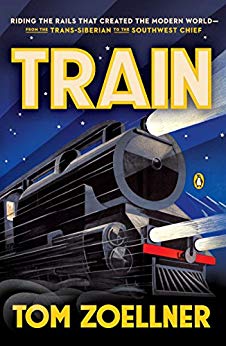Now in paperback from Penguin-Random House

It’s the story of the most indispensable mode of transportation the world has ever known: the railroad.
We live in a world created by trains. They made our modern food system; the beat of our music; our huge corporations with their financing methods; our labor unions; the shapes of national borders, the suburbs that surround our major cities; our abstract notion of time and space; and our sense of connection with people who may live far out of sight but still become our neighbors.
An entertaining journey around the world by train, as well as a masterful narrative history, Tom Zoellner’s extraordinary book is a call to re-embrace the train. Trains never went away. We just forgot them. Now it is time to climb on board again.
“Spirited and bighearted. . . . Zoellner enlightens us about an industry that’s hiding in plain sight.” — San Francisco Chronicle
“Highly entertaining, lucid and perceptive. . . . It’s a train lover’s celebration of the great epic story of rail travel itself.” — Los Angeles Times
I once heard a respected editor of hardcover nonfiction say that there has never been a first edition of any book that didn’t go out with at least one error. I was yearning to change that with this book, but a few train enthusiasts — who know their material better than a pilot knows his wheel — have written in to point out some inaccuracies. I am chagrined at these mistakes and will incorporate the corrections into the paperback version, to be released by Penguin on October 27, 2014. That one will be as perfect as I can make it. Special thanks to Fred Frailey, Gordon Geiger, Frank Heppner and the Rev. Dr. Ralph Becker for their eagle eyes.
Meantime, here is a running log of the location of my mistakes, with the corrected sentence(s) appearing below:
Page 102 — “The power behind it is stupendous – the electric locomotive up front weighed 150 tons and possessed the nominal horsepower of a dozen Cadillacs – but it felt as effortless as an ice-skater’s glide.”
Page 117 — “By the 1870s the budget and the employment base of the Pennsylvania Railroad were big enough to rival that of the federal government. Most of them were engaged in the hard labor of laying track.”
Page 152 — “Onward, then, past the beef packing plants at Garden City and the town of Holcomb, where the writer Truman Capote had taken the Santa Fe Railroad out in 1959 to talk to the jailed killers of the Clutter family for his book In Cold Blood.”
Page 170 — “President Dwight Eisenhower eagerly promoted it, telling everyone how impressed he was by the German autobahns he had seen after the Second World War.”
Page 175 — “”This gives people the opportunity to be the engineer; to be part of something larger-than-life,” said Neil Besougloff, the editor of the well-read enthusiast magazine Model Railroader.”
Page 177 — “I lay there in a restless haze until the lights of the station at Barstow invaded the curtains, and I knew I ought to give up.”
Page 292 — “Monopolies like Deutsche Bahn in Germany and SNCF were able to make command decisions with generous subsidies, whereas in the U.S., the political emphasis (and the federal stimulus money) went toward building the Interstate Highway system.”

Tom Zoellner is the New York Times bestselling author of nine nonfiction books, including Uranium Train and The Heartless Stone. He teaches at Chapman University and Dartmouth College. A former reporter for the San Francisco Chronicle, he is the editor-at-large at the Los Angeles Review of Books.



